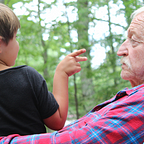1951: I turn twelve
A Man Who Never Went to War
Every man harbors an inner female territory ruled by his mother, from whom he can never entirely break free.
-Camille Paglia, Sexual Personae
There were always bad men out there in the night, in the dark, in the attic, or in the woods; I was always the target of others bent on hurting me, killing me. Maybe when I was a two-year-old these things were wolves or bears or other animals out to get me; but throughout childhood “it” was human. A witch, an evil woman — no. Those lurking and plotting and about to take me were all men; deranged or terribly damaged coming to damage me.
After flashlights were out and the bullfrogs croaked on the edges of the still water of the cove, the counselors and older boys told stories about “bad men.”
There was the man who stole another man’s “golden arm” and how the victim went into a cemetery searching; there was the chopped-up young-man returning home from an accident at the paper mill; there was the man, a murderer, listening to a beating heart under the kitchen floor; there were “dirty Japs” and sadistic Nazis taking pleasure in torturing American soldiers; but it wasn’t any of them who took hold of me that night.
In the company of two counselors I was getting ready to sleep in the Little Bunk House. The bullfrogs chanted and warned with their deep bassooning, retching sound — yet not distressing — just a steady gaa-rump, gaa-rump, gaa-rump.
Moments after we settled into our bunks, the bullfrogs went silent, and I looked out through the screens into the night, and it was then, and with no warning, no inkling, that a terrible something reached into my gut. It, it squeezed, it turned, it pressed, it twisted. It sank me into a pit of sadness. It was not a man; more like a hand. A hand reaching into my stomach and with no pause pulling a terrifying sadness over the whole of me — my face, arms and legs, my head, my loins, my lungs — especially my lungs — making me gasp for air.
Then came a sigh — a long sickening sigh rising and snapping around my head like the narrow band of a hat, like a crown of tiny thorns pricking and scratching just over my eyes and ears — swelling my chest, my lungs gasping for air.
This terrible sadness came upon me in the time it takes a punch in the stomach to register in the brain; and then I was up and out of the bunkhouse with my flashlight dodging down the rocky path to the head of the cove and then leaping up the huge stone steps to the Big House. My sister, mom and dad were already in bed. “I need help,” I called.
My mother came and seeing my sadness and fear, held me. “What happened? What’s the matter? Tell me.”
Dad came from the bedroom, and asked, “What’s going on old man?” He often called me “old man.”
All I could say was that I had this very bad feeling inside me; it’s like a hand squeezing the air out of me,” I said, “I feel so sad, Mama, so sad.” I was not crying. My insides were too dry to cry.
Mom let me sleep next to her, turning away from dad on the other side of the bed she put her arms around me. I prayed, “dear God, make this thing go away.” Cradled in my mother’s arms, I slept.
The campers soon arrived at Camp Husky. Summer mornings in Maine are cool if not cold, and yet a tradition prevailed at the camp of a couple of counselors and a couple of kids — following Coach, my dad — diving into the cold lake each morning. Last summer I might have been one of the ones taking that plunge hollering. No more. The sounds were just sounds.
I would wait in the Big House until the camp kids came and went from breakfast before walking to the mess hall for some food. Whatever I ate made me nauseous.
I do not remember what I did at the Big House for most of every day, perhaps because I did so little. When there were sports being played by the boys in the clearing I would often go there, and at times join in. But it was always the same. That feeling trotted round the bases with me, passed through the basketball net, and then accompanied me back to the Big House or to the mess hall.
Five weeks into the camp season I got into the backseat of the car with Sister, and with Mom and Dad rode to the nearest town to visit a medical doctor.
After just a few minutes, during which it had come again and taken hold of me, Sister and I were sent out to the car where we waited for our parents. I curled up as best I could on the floor of the back seat where I whimpered. I was certain they would send me to the state hospital, that monstrosity on a hill at the edge of town back home — stone walls, towers, many towers, and windows with bars.
Mom and dad came back to the car. The doctor had explained that this terrible feeling was called “depression,” and that he understood it very well because it was something he had experienced. Mom said, “The doctor thinks you’ll get better.”
Within a few years this doctor would commit suicide.
Read more of A Man Who Never Went to War: 1952: I turn thirteen
